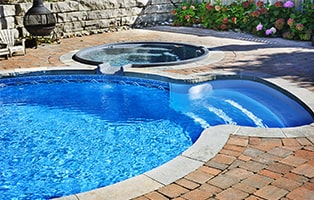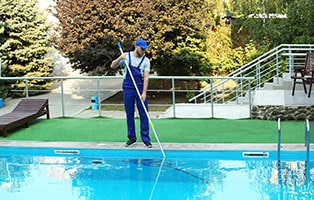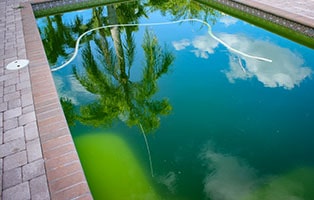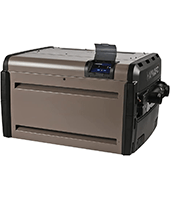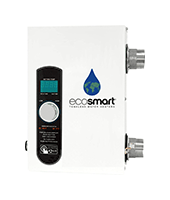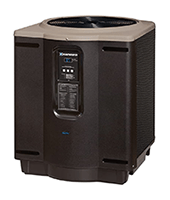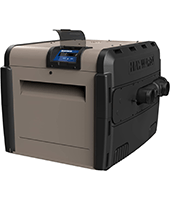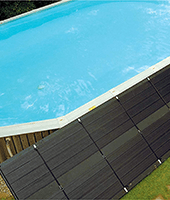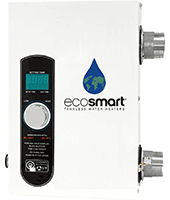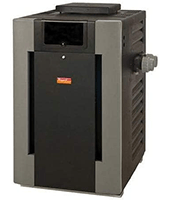 Swimming Pool Heaters: Here’s our 2023 complete guide to get the best!
Swimming Pool Heaters: Here’s our 2023 complete guide to get the best!
Visualize this: it’s a gorgeous summer day, and the sun shines high in the sky as you bask in its delicious warmth. Your swimming pool glistens in delightfully shimmering patterns as solar rays reflect off it. You’re ready to dive into the inviting turquoise waters but stick a toe in the pool first to check the temperature.
Unfortunately, your appendage tells you it’s too frigid to take a dip. This means you won’t be able to go for a swim until the water heats up naturally—which, depending on the climate where you live, could be weeks or even months.

If you had a pool heater, you wouldn’t have this problem! It can help you keep the waters of your backyard swimming oasis at a comfortable temperature all season long. Not having one means wistfully watching your neighbors revel in the blissful feeling of swimming in a heated pool while yours is covered until summer.
Using a pool heater can extend your pool season by about two months if you live in a cooler climate. Even if you live in a balmy place all year long, day and night temperatures can vary wildly. With a pool heater, you can go for a dip even if there’s a bit of a chill in the air.
Editors’ Choice for the Best Pool Water Heaters of 2023
We select, test, review and suggest the best products. We may earn a commission, if you buy something through our links.
Best Swimming Pool Water Heaters And the Energy Sources They Use
If you want to find out what the best pool heaters of 2023 are for inground and above ground pools, you’ve come to the right place! But first, let’s talk about the different pool warmer options available.
There are four types of pool heaters: solar, electric, heat pump-style, and gas. A solar pool heater system is a fantastic option if you live in a sunny area and don’t mind waiting a day or two for your water to heat up in your swimming pool.
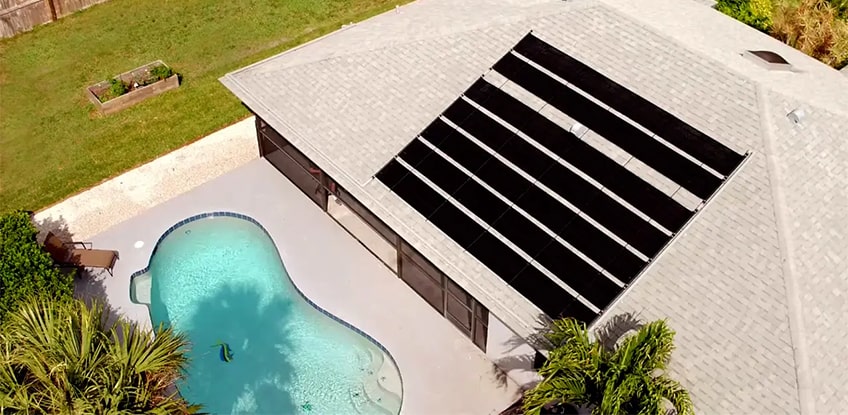
The sun’s warming rays naturally heat the water in your pool. With a solar-powered pool heater, this effect gets amplified a thousandfold. It allows you to enjoy an increase of 10 to 13 degrees in your pool water without worrying about sky-high operating costs or contributing to air pollution.
Electric pool heaters work the same way as tankless water heaters. Water is pumped into the unit and is heated as it passes over a heating element.Their compact design and size makes them perfect for pool areas with limited installation space such as spas.
Next up are pool heat pump-style heaters. A heat pump doesn’t generate heat from a heating element like an electric heater. Instead, it harvests warmth from the air and transfers it to your pool water. This is much like how an air conditioner works, only in reverse.
Because heat pump-style pool heaters move heat from one place to another instead of creating it, they use only a tiny amount of electricity to run the compressor and other components. This makes them super-efficient and an excellent choice for environmentally conscious pool owners.
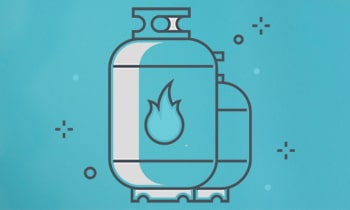
There are two types of gas pool heaters: natural gas pool heaters and propane pool heaters. They both burn gas in their combustion chambers, which heats water flowing through copper coils before flowing back into your pool. Unlike solar heaters and heat pumps, a gas heater doesn’t rely on sunlight or air temperature to operate, making them a better choice for people in colder climates.
If you own a saltwater pool, you’ll need to determine if the pool heater you’re considering buying is compatible. While you can use any type of heater in a saltwater pool, it could corrode if not intended for saltwater use. That’s because many pool heaters have copper elements, and saltwater can cause these components to rust.
The Hayward W3H250FDP Universal H-Series with 250,000 BTUs is the best Propane Gas Pool Heater you can buy.
A gas pool heater burns natural gas or propane in a combustion chamber, which heats water flowing through copper coils before flowing back into your pool. These types of pool heaters can run on natural gas or propane.
Because propane costs twice as much as natural gas, it’s the more expensive option. However, propane is more energy-dense than natural gas, so you’ll get more bang for your buck than you would from the same quantity of natural gas.
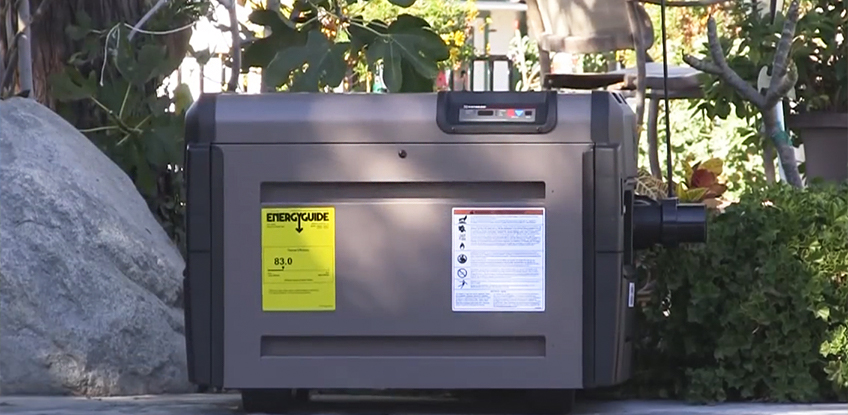
Pool heaters running on natural gas require access to a pre-existing gas line. Because you’re always connected to this line, you’ll never have to worry about running out of fuel. If you don’t have access, you’ll need to buy a propane pool heater or pay to have a line installed.
Because most pools are in a person’s backyard and a bit of a distance from natural gas connections near the street, it can be quite costly to run natural gas lines to your pool area. That’s why propane is often the better choice when deciding what kind of gas-powered heater to get.
If you’re going with propane, make sure you have enough space for a standalone tank. For a 21,000-gallon pool, you’ll need a heater with a BTU of between 300,000 and 400,000, which means you’ll need a 200-gallon propane tank.
California has been leading the country in addressing human-driven climate change by working to lower greenhouse gas emissions. One of the target gases is nitrous oxide, emitted by gas-burning devices such as generators and furnaces.
The Golden State seeks to reduce harmful emissions by 40% by 2030. If you live in California or a state trying to do what this state is doing, you’ll need to buy a propane pool heater that meets these rigorous standards. If you want to read more about propane pool heaters, check this article out.
The Hayward W3H250FDN Universal H-Series 250,000 BTU is the best overall Natural Gas Pool Heater. Read all about it in our 2023 review!
When deciding which natural gas pool heater to buy, look closely at heater efficiency. This is the ratio of usable output to total energy output. The higher the efficiency, the lower your pool heater natural gas cost will be. For example, a 75% efficient unit converts $75 worth of gas into usable energy for every $100 spent.
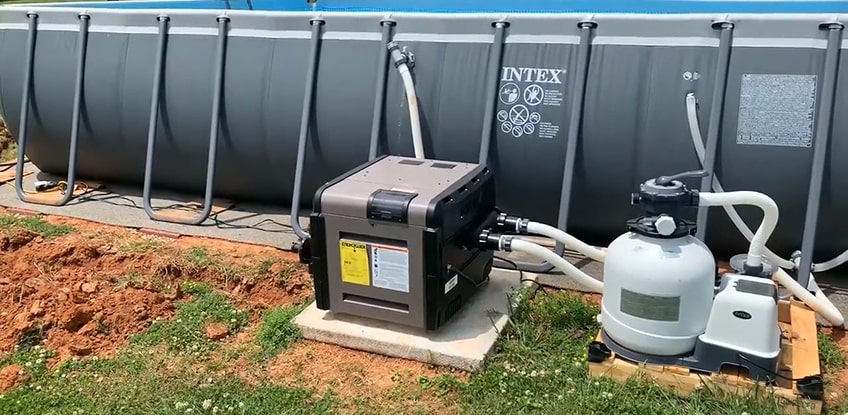
Some gas pool heaters feature their efficiency percentage on their nameplates. A pool heater manufacturer can also provide this information.
A common complaint among gas heater owners is that sometimes, their units suffer from an appalling lack of durability. That’s why you need to pay close attention to the housing that protects your unit and whether the corrosion protection is sufficient. You can prevent heat exchangers and other components from prematurely rusting out by ensuring that your pool chemistry is always balanced.
Gas-Powered Pool Heater Advantages

Unlike solar heaters and heat pumps, a gas heater doesn’t rely on sunlight or air temperature to operate, making them a better choice in colder climates. They produce more heat than electric and solar models in less time and are ideal for people who only occasionally use their backyard swimming oases.
Gas-Powered Pool Heaters Disadvantages

Gas heaters are less energy efficient than solar heating systems and heat pumps. Their fuel emissions make them the least ecologically friendly of all heater types, and they tend to wear out faster than other kinds. Check out our rating of natural gas pool heaters if you’d like more information.
The SunHeater S240U is the best Solar Pool Heater. Read our article to find out why!
A solar pool heater is an excellent option if you live in a sunny area and don’t mind waiting a day or two for your water to heat up. While traditional pool heaters such as electric or gas are more powerful, pool solar heaters are becoming increasingly popular because they’re less expensive to operate and are more ecologically friendly.
The sun’s warming rays naturally heat the water in your pool. With solar pool heating, this effect gets amplified a thousandfold. It allows you to enjoy an increase of 10 to 13 degrees in your pool water without worrying about high costs or contributing to air pollution.
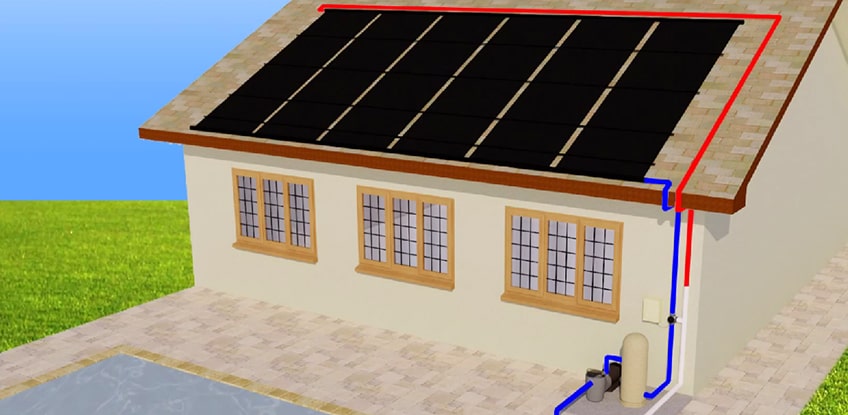
A solar panel pool heater enhances the natural effect of the sun using three components: a panel and your pool’s existing pump and filter. The pump forces water through the filter to strain out leaves and debris. Then, water is pumped into a solar panel mounted on your roof, fence, porch, or other location with excellent sun exposure. The water heats up as it moves through the panel and flows back into your pool.
What Solar Pool Heaters are Made Of
Most solar heaters are manufactured using black polypropylene. This material is flexible and lightweight, which is good news for DIYers looking to mount solar panels to their roofs themselves. Although water can’t damage polypropylene, it can be weakened by the sun’s relentless UV rays.
That’s why polypropylene in high-quality solar heaters is first treated with a stabilizer that protects the material from the sun’s harsh rays. Most solar pool heaters will last for 10 to 15 years before the material begins to break down due to damaging UV rays and exposure to extreme temperatures.
Solar Pool Heater Advantages

The energy generated from a solar heater is almost 100% free, the only cost being the electricity running your pool’s pump. This makes a solar pool heater the perfect solution for people who want to keep their pools comfortable all season long but don’t want sky-high utility expenses.
These days, people are becoming increasingly conscious of their environmental impact. Energy sources that rely on fossil fuels mean generating emissions that contribute to the greenhouse effect. This makes solar pool heaters a smart choice for ecologically minded pool owners.
Installing a solar heater might make you eligible for solar tax credits. Because the laws around them change frequently, check state and local laws and energy regulations to determine if you’re eligible for them and, if so, how much you can get.
Solar Pool Heater Disadvantages

While this type of heater has the lowest operating cost, it takes a bit longer to heat up your pool water than the other types. Also, the performance of this kind is directly linked to the amount of sunlight shining on it. This makes it a fantastic choice for geographic areas with lots of sunny days but a less attractive option in areas with substantial cloud cover.
Solar heaters take up more space than the other types and require between 50 and 100% of your pool’s surface. That’s why if you have a larger pool, you should probably get an electric or gas model instead.
Read our review to find out what makes the EcoSmart Pool 27 the best Electronic Pool Heater!
Electric pool heaters work the same way as the tankless water heaters used to provide hot water for homes. Water is pumped into the unit and is heated as it passes over a heating element. Warmed-up water is then returned to the pool, creating a pleasant swimming environment.
The Advantages of an Electric vs. Gas Heater

Because electricity is typically the most easily accessible heat source for a pool, electric water heaters for pools are popular in places with no existing natural gas lines.If keeping the noise levels down in your backyard swimming oasis is important to you, you’ll be ecstatic to hear that electric pool heaters are usually quieter than gas-powered ones.
The initial price tag for an electric pool heater is often less than their gas- or solar-powered counterparts.If you have a tiny pool or spa, you’ll find them more energy efficient than gas heaters. Unlike gas heaters, most can be located in a shed where ventilation is minimal. Some of them can even be installed indoors if this is where your pool happens to be.
Other Electric Heater Advantages
The compact design of electric heaters makes them perfect for pool areas with limited space. Unlike heat pumps, electric pool heaters work no matter how frigid the temperature gets.
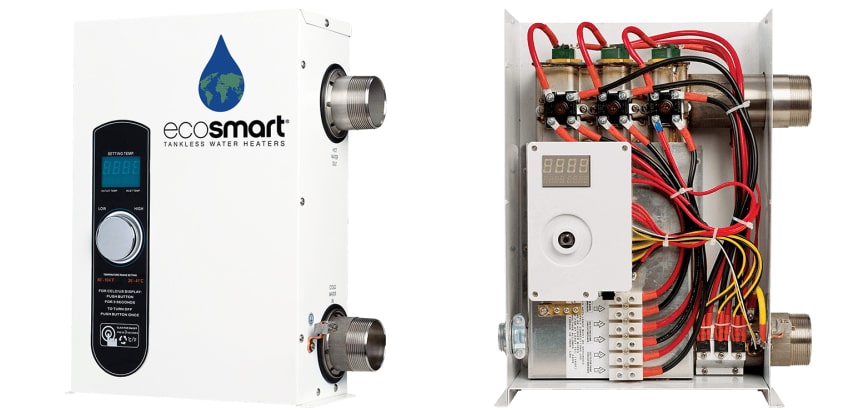
You can unplug and safely store them away for the winter to protect them against harsh meteorological conditions. Electric heaters are simpler to install than most other heater types.
Because an electric pool heater doesn’t generate planet-destroying greenhouse gases, you can feel good about using one. If your energy company supplies you with energy from wind or solar power, using an electric pool heater has close to zero environmental impact.
Electric Heater Disadvantages

If you live in a cold climate or need your pool heated up quickly, you might be disappointed to find out that electric heaters cost more to operate. Often, the electrical needs of this type of heater exceed a home’s capacity.
This means an electrician will need to make changes in the electrical configuration of your home before you can safely operate this heater type. If you need recommendations on which electric heater to buy, check out our top-list of electric pool heaters.
The Hayward W3HP21404T HeatPro 140,000 BTU is the best Pool Heat Pump on the market. Read our review to find out why!
A pool heat pump doesn’t generate heat from a heating element like an electric heater. Instead, it harvests warmth from the air and transfers it to your pool water. This is much like how an air conditioner works, only in reverse.
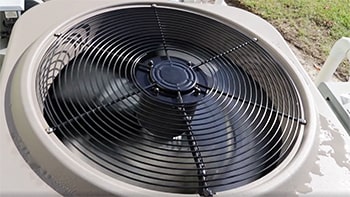
The heat pump pool heater’s fan sucks in outside air and directs it over an evaporator coil. Liquid refrigerant within the coil absorbs heat from the outside air and becomes a gas. The warm gas in the coil passes through the compressor, which makes the gas hotter. Then, the gas goes through the condenser. The condenser transfers the heat from the hot gas to the cooler pool water circulating through the unit.
The water, now heated, flows back to the pool. The hot gas travels through the condenser coil and turns back into a liquid as it heads for the evaporator. Then, the process begins again.
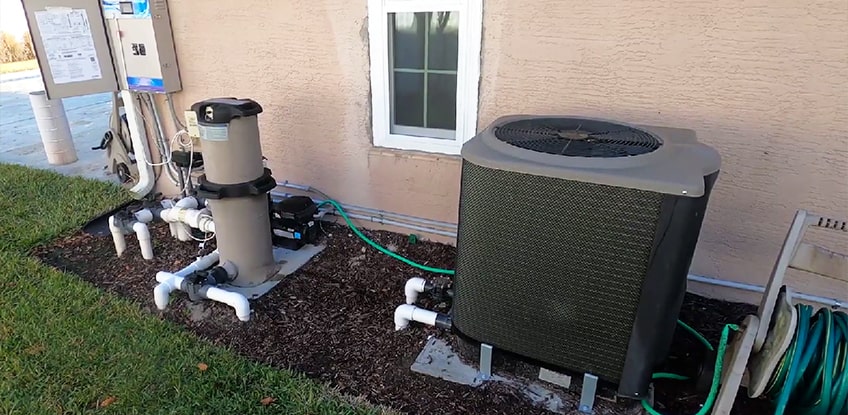
Most heat pumps shut down when the temperature gets below 50 degrees and start up again once the temperature reaches 50. Some heat pumps can work in temperatures below 50 if they have an active hot Freon defrost. You can boost the performance of your heat pump on cool days by using a solar blanket.
The Advantages of Heat Pumps vs. Gas Pool Heaters

Heat pumps are cheaper to run than gas heaters if you keep your pool water at a moderate temperature. Because heat pump-style pool heaters move heat from one place to another instead of creating it (like gas-powered heaters do), they use only a tiny amount of electricity to run the compressor and other components. This makes them super-efficient and an excellent choice for environmentally conscious pool owners.
Heat Pump-Style Pool Heater Disadvantages

Heat pumps typically take longer to heat your swimming pool than other styles of electric heaters. On the other hand, gas and propane pool heaters use more energy than pool heat pumps because they create heat rather than extracting it from the air.
However, if you live in a colder climate, a heat pump will use more energy than the other types. That’s because it’ll take a lot of work to extract the warmth from the frigid atmosphere. In fact, if you live in a place with wild day-to-night fluctuations you might not be able to use this type of heater at all. Read more about pool heat pumps in our informative article about the subject.
How to Choose the Type of Pool Water Heater That’s Best for You
When choosing how to heat a pool, there’s no one-size-fits-all solution, or a magical calculator that can instantly figure out what’s best. It requires careful consideration of your particular circumstances. and what kinds of costs you’re willing to incur including installation. Here are some factors to think about:

- Pool Size – The amount of water you’re looking to heat plays a significant role in determining how large a heater you’ll need. However, there are other factors to look at. If you’re buying a unit to heat a tiny above-ground pool, knowing the number of gallons you’re heating is the most crucial factor. Surface area is more important when looking to heat a large in-ground pool. That’s because bigger pools with a lot of surface area exposed to the wind, cold rain, sun, and evaporation have more significant heating needs than smaller ones.
- How Often You Use Your Pool – If you use your personal swimming hole every day, you’ll probably want to keep it at your optimal temperature most of the time. You can accomplish this by using a smaller heater that generates lower BTUs. If you only swim on weekends, your heating needs won’t be as significant. This means that a fast-heating unit that has a high BTU output could be the right choice for you. However, if it’s warm where you live, you won’t need as big a size. In fact, if it’s sweltering much of the time, you might want to look for an electric heater with water cooling capabilities.
- Climate – One of the most critical things to consider when choosing which pool heater to buy is the climate you live in. If you live in a region of the planet with frigid nighttime temperatures, you’ll need a powerful heater to combat the effect evenings have on your pool temperature. Look for a gas-powered unit with as much heating capacity as possible because when it comes to cooler climates, the bigger, the better.
- Some Other Things to Consider
A gas-powered heater might be best for you if you have a spa attached to your pool that you need to heat to over 100 degrees Fahrenheit. It might also be the most suitable choice if you plan on warming up your pool early in the spring, late into the autumn, or year-round.
If adding a 30-to-50-amp breaker requires significant modifications to your existing electrical service, you might want to go with a gas heater instead of an electric one. Otherwise, the price you pay for your heater might be more than you’re willing to pay. If you already have at least a 500-gallon propane tank on your property or your gas meter is located right next to your pool equipment pad, a gas-powered unit could be the option that makes the most sense.
On the other hand, if an environmentally friendly choice that doesn’t spew greenhouse gases into the atmosphere is the most crucial factor, consider getting a pool heat pump. This also might be the type to get if you don’t swim much when the outside temperature gets below 60 degrees Fahrenheit. Or, if you don’t mind your pool water taking a long time to heat up.
The Raypak 206,000 BTU Digital Electronic Above Ground Pool Heater is the best you can buy. Our in-depth article tells why.
There are four kinds of above-ground pool heaters: solar-powered, electrically-operated, heat pump-style, and those that run on gas (either natural gas or propane). Although they all warm up your pool water, so it’s nice and toasty, each uses a different method to achieve that objective.
Buy a gas-powered heater if you want a really quick way to heat up your pool water. While solar-powered pool warmers are the cheapest and most energy-efficient way to heat up your pool, this method takes several days.
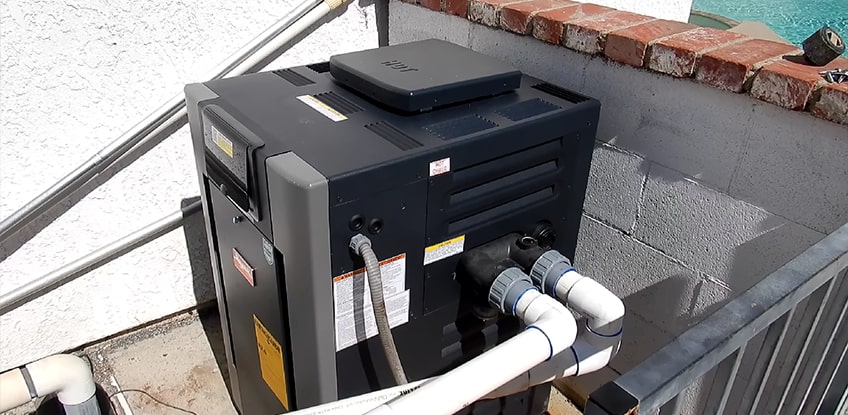
There are also electric and heat pump-style pool heaters. While electric heaters heat your above-ground pool more rapidly, heat pumps do it much more efficiently. Not all pool heaters work with pools of the above-ground variety. However, there are a number of them that do.
How big your pool heater for your above-ground pool needs to be depends on pool volume and how many months out of the year you plan to swim. The bigger the above-ground pool, the more BTUs you’ll need to efficiently heat the water. Pools that hold up to 13,000 gallons only require a 50,000 BTU heater, while larger pools of up to 21,000 gallons need at least 85,000 BTUs.
The Hayward W3H250FDN Universal H-Series 250,000 BTU Natural Gas In-Ground Pool Heater is the best heater you’ll find for this type of pool.
If you’re looking for an in-ground pool heater to keep your pool water at a comfortable temperature, keep in mind that there are four different kinds: solar-powered, electrically operated, heat pump-style, and those that run on gas.
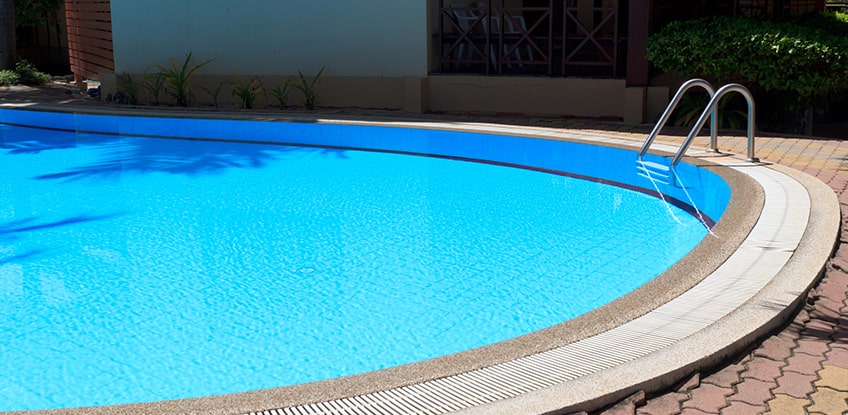
Electric pool heaters for inground pools use a heating element to warm up pool water. Heat pumps suck out warmth from the outside air and are amazingly efficient.
A solar pool heater for an in-ground pool uses the sun’s free energy to make your pool water warm enough to swim in. If you want to put in a solar pool heater in your backyard, you’ll need to live in a relatively balmy climate with plenty of sunshine.
If you live in a frigid place where nighttime temperatures can reach bone-chilling levels, you’ll probably want an electrically operated or gas-powered model. That’s because they’ll be able to get your pool water hotter and do it much more quickly than the other types.
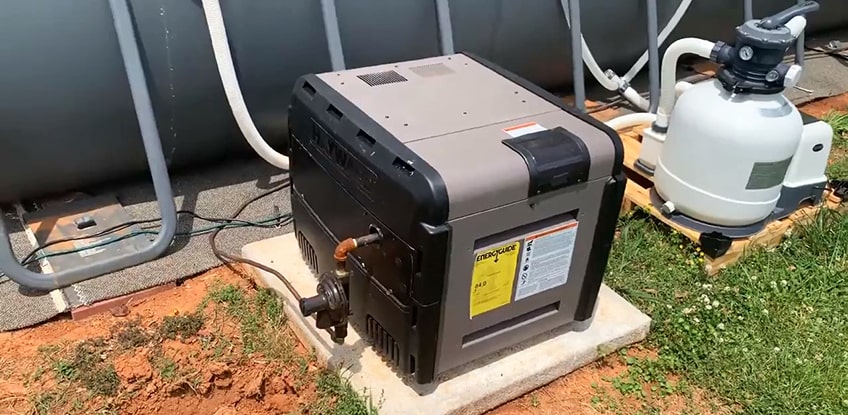
A gas-powered heater could be your best bet if there’s an existing natural gas line near your pool. This type of heater is popular in chillier locations because, unlike solar-powered and heat pump-style models, they’re effective no matter how frigid it gets. Although they cost more to run than electrically operated or solar-powered models, they generate more heat in a shorter time frame.
What’s the Most Comfortable Pool Temperature
The answer to the question, “What’s the most comfortable pool temperature?” depends on several factors, including how you plan to use your pool. For example, you’ll probably want your pool warmer if you’re lounging around. You’d typically prefer it a little cooler if you’re doing strenuous activity.
However you’re going to be using your pool, you need to be vigilant about regulating its temperature because failure to do so can compromise your safety. This includes not exposing yourself to temperature extremes for long periods, which is particularly dangerous for those with acute medical issues, pregnant women, and children.
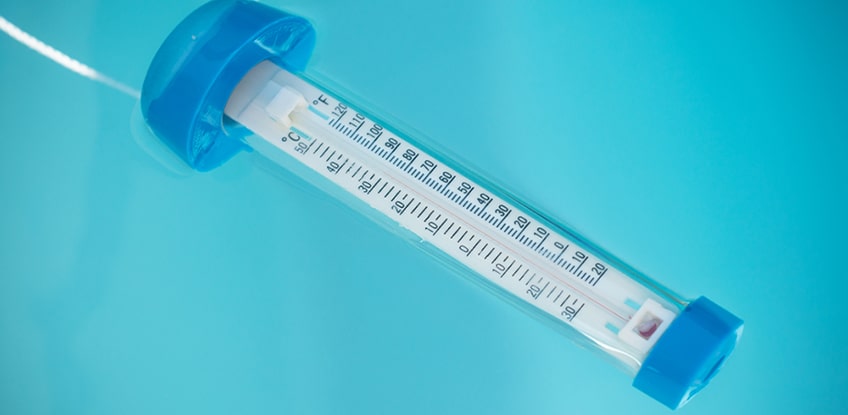
The National Swimming Pool Foundation’s official guidelines are pool temperatures of 82 degrees Fahrenheit for adult recreational swimming and between 90 to 93 degrees Fahrenheit for kids aged four and younger. Water below 78 degrees Fahrenheit can cause severe breathing difficulties, especially for people with respiratory ailments such as asthma and COPD.
Safe water temperatures depend on what kinds of activities you’re doing. According to the World Health Organization, water temperatures ranging from 58 to 86 degrees Fahrenheit are considered okay for those getting a moderate level of pool exercise.
The more strenuous the water-based activity, the more critical it is for the water not to be overly warm. That’s because the hotter the water is, the more your blood pressure will increase. This can lead to feeling dizzy or even passing out.
Jumping into a pool with water between 50 and 60 degrees can be hazardous. That’s because water this cold can cause you to hyperventilate as you desperately gasp for air. Your body goes into cold shock, which means you won’t be able to swim, which significantly increases the risk of drowning.

Unregulated pool temperatures cause more problems than merely affecting bodily processes. For example, bacteria, algae, and other microorganisms will flourish like there’s no tomorrow if your pool is too warm. Because pool-borne bacteria can cause life-threatening diseases, they should be eliminated immediately.
Another problem is algae. You’ve got an issue with it if you see a green film or disgusting green, brown, or yellow gobs destroying the pristine purity of your swimming water. Algae can cause swimmers to have itchy skin, give the pool a nasty odor, and clog your filtration system to the point it no longer works.
The best way to keep your pool temperature comfortable is by using a heater. These devices have built-in thermostats and continue to operate until they reach your desired temperature level. Some pool heaters have timers that turn the unit on during times you’re most likely to swim.
How Long Does it Take to Heat a Pool
How long it takes to heat up your pool depends on pool size, BTUs of your unit, and desired temperature.
Here’s the formula:
For instance, if you want to raise the temperature in a 20,000-gallon pool by 15 degrees with a 100,000 BTU heater:
20,000 x 8.33 = 166,600
166,600 x 15 = 2,499,000 needed to heat the water 15 degrees
2,499,000/100,000 = 24.99 hours
The Cost of Different Types of Pool Heaters
Heaters That Operate on Natural Gas or Propane

Pool heater prices and their operational expense vary widely depending on the model. For example, gas-powered pool heaters are cheaper to buy than solar-powered or heat pump-style models. Installation is also less expensive. However, you’ll shell out more money to operate them than you would if you had bought one of the other types. Expect to pay between $1,500 and $6,000 for a heater fueled by gas, with an additional $500 to $1,500 in labor costs.
Fuel for gas-powered heaters is either natural gas or propane. While propane contains more energy per gallon than natural gas (thus giving you more bang for your buck), it’s usually more expensive. Expect to spend $200 to $850 a month with a pool heater powered by propane compared to $100 to $400 for a natural gas one.
Heat Pump-Style Heaters
Heat pump-style pool heaters have a higher initial purchase and installation cost than gas-powered models. While you can get an above-ground heat pump heater for under $1,000, most will set you back $2,000 to $6,000, including installation.
However, this heater style has lower operating costs than gas-powered models because they’re so much more efficient. These operating expenses are usually $50 to $150 a month.
Solar-Powered Pool Heaters
Harnessing the sun’s limitless power to heat your pool makes the energy you generate almost 100% free. If you’d like to do this, it’ll cost you between $2,500 and $7,500 to buy and an additional $500 to $1,500 to have someone install it for you. What’s great about a solar pool heating system is the only ongoing cost is the cost of electricity to power your existing pool pump—usually less than $75 a year.
Electric Heaters
While pool heater costs are usually less for electric models than gas-powered ones, your operating expenses will most likely be higher because gas heaters aren’t as efficient. To install a gas pool heater, you’ll pay about $2,000 to $5,000, including labor, and monthly operating expenses will be $100 to $600.
How to Calculate Pool Heater Size
To know how much heat a pool heater gives off, you’ll need to look at its BTU (British Thermal Unit) rating. A BTU measures how much energy you’ll need to boost the temperature of one pound of water by one degree Fahrenheit. Most pool heaters have BTU ratings between 150,000 and 400,000.
Your pool heater should generate at least 50,000 BTUs for every 10,000 gallons of water in your backyard swimming oasis. For a pool with 20,000 gallons, you’ll need a heater with an output of at least 100,000 BTUs. The more BTUs your unit is rated for, the faster it’ll warm up your pool, and the sooner you’ll be able to take a refreshing dip.
To calculate heater size for an outdoor pool a little more precisely, try to figure out your ideal temperature. Next, calculate the average temperature for the chilliest month you’ll be using your pool. Subtract this number from the first number. This is how many degrees your heater needs to raise the water to reach your ideal temperature.
Once you have this figure, determine the surface area of your pool in square feet. Lastly, use this formula to determine the BTU output requirement of the heater: Pool Surface Area x Temperature Rise x 12.

Installation Tips for Pool Heaters
You should have a licensed electrician and a technician certified in working with natural gas devices to assist you with a heat pump-style pool heater installation even if you’re doing most of the work yourself. That’s because you shouldn’t fool around with these types of hookups if you don’t know what you’re doing.
Because heat pumps require lots of air circulation, it’s best to install them in a location with plenty of clearance and no obstructions. An ideal installation will have approximately 24 inches of clearance around the unit with no blockages above it. It should be on level ground near your pool’s dedicated filtration system and no more than 25 feet away from the pool. The tubing is underground, and locating the unit farther away could cause significant heat loss.
Before proceeding with the heater installation, remove all debris, such as stones and roots from the area and ensure that the ground is level. Excavate a hole for the equipment pad, which you’ll use to keep all the pool heater components in place.
Once you install the unit and run it in heating mode, ensure the exhaust from the top is cooler than the ambient air. This is an indication that your heat pump is working correctly. If the heat pump still runs after you turn the water pump off, kill the power to the unit and call the manufacturer for advice.

Pool Maintenance Tips & Tricks
